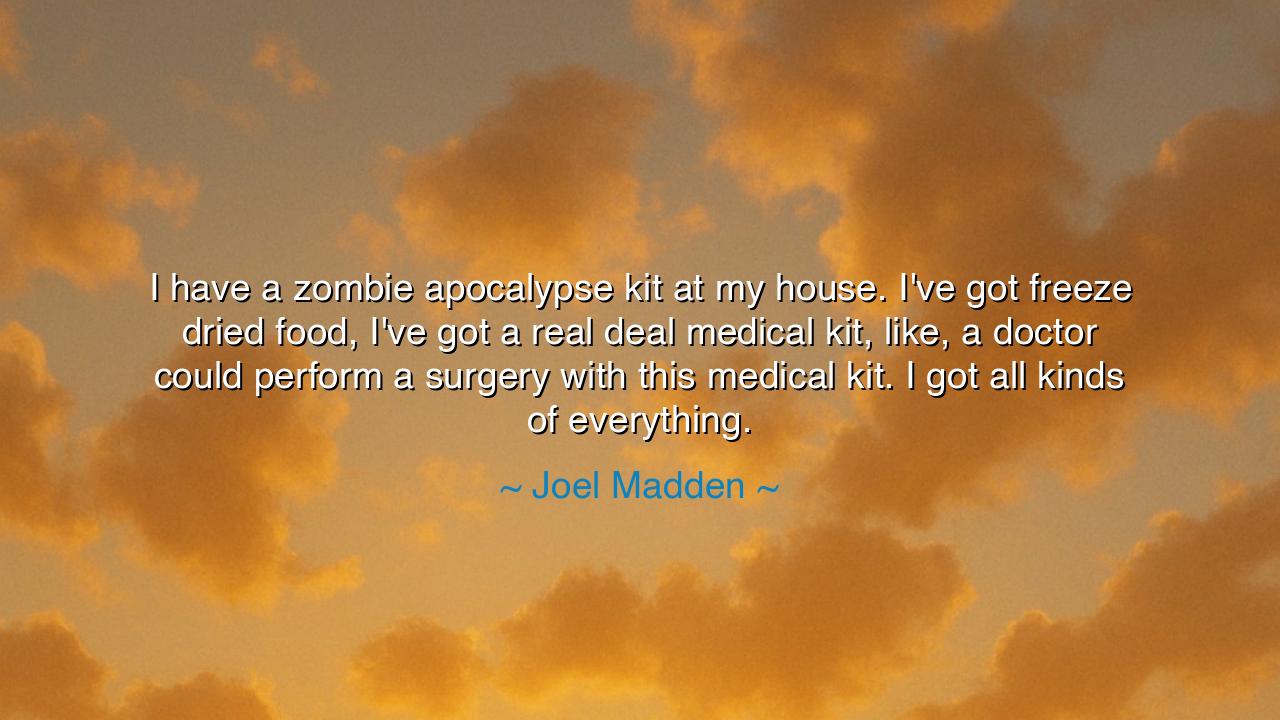
I have a zombie apocalypse kit at my house. I've got freeze dried
I have a zombie apocalypse kit at my house. I've got freeze dried food, I've got a real deal medical kit, like, a doctor could perform a surgery with this medical kit. I got all kinds of everything.






In a world ever teetering on the edge of the unknown, there are those who, like Joel Madden, prepare not just for the comforts of the present but for the uncertainties that the future may hold. In his reflection, "I have a zombie apocalypse kit at my house. I've got freeze-dried food, I've got a real deal medical kit, like, a doctor could perform a surgery with this medical kit. I got all kinds of everything," Madden speaks to a universal truth: that preparedness is a form of wisdom. It is the foresight to understand that the world can shift in an instant, and when it does, it is not those who wait but those who act who will find the strength to endure.
In the ancient world, the concept of preparation was deeply intertwined with the philosophy of survival and wisdom. The Romans, known for their discipline and strategic foresight, understood that no empire could last without being prepared for both external threats and the natural rhythms of life. Cicero, a Roman philosopher and statesman, often spoke about the importance of prudence and foresight in leadership. He believed that preparedness was a virtue that ensured not only the survival of a people but also the flourishing of society during times of hardship. Madden’s approach to preparedness reflects the ancient understanding that life is full of uncertainties, and only those who take action in the present can shape their future.
The ancient Egyptians provide another powerful example of foresight. Their meticulous planning, both in the construction of their pyramids and in their approach to farming, was a form of deep wisdom. The Egyptians understood the importance of stockpiling resources in times of plenty so that they could endure times of famine or scarcity. This practice of storing grains and other essentials, coupled with their advances in medicine and engineering, made them one of the most advanced civilizations of their time. Much like Madden's zombie apocalypse kit, the Egyptians prepared for every eventuality, ensuring that they had the means to survive, adapt, and thrive regardless of what challenges came their way.
The story of Joseph in the Bible offers another poignant example of the importance of preparedness. Joseph, who rose to power in Egypt, was able to save his people during a time of great famine because he had wisely stored grain during the years of plenty. His foresight not only saved Egypt but also neighboring nations from starvation. Joseph's wisdom lay not only in understanding the cyclical nature of life but in his ability to act with prudence in moments when others were complacent. Like Madden, Joseph recognized that the future could not be predicted, but that one could prepare for it through careful planning and action in the present.
Madden’s mention of a doctor-level medical kit speaks to the ancient concept of self-sufficiency. The ancient Greeks valued the ability to be self-reliant, especially in times of crisis. The philosopher Diogenes is a prime example of someone who, through self-sufficiency, found peace amidst chaos. While many sought material wealth and comforts, Diogenes lived in a barrel, relying only on the essentials. He demonstrated that true strength comes not from external circumstances but from within—by being prepared and equipped for life's uncertainties. Madden’s medical kit symbolizes that same ethos: the ability to provide for one’s needs and care for oneself and others, even when the usual systems of support are no longer available.
The lesson to be drawn from Madden’s words is timeless: preparation is not an act of fear, but one of wisdom. It is the acknowledgment that life is unpredictable, and the best way to face the future is not by wishing away the unknown but by embracing it with a plan. Whether in terms of physical survival or emotional endurance, being ready for the challenges ahead makes us more resilient, more adaptable, and more capable of thriving despite adversity. The ancients knew this, and Madden's statement serves as a modern reminder that in every time of plenty, we must also prepare for times of scarcity, and in every season of peace, we must remain ready for storms.
In your own life, consider the areas in which you can be more prepared—whether it is in your career, your finances, or your personal growth. Take action now, while you have the resources, to ensure that you are ready for whatever the future may hold. Like the Romans, Egyptians, and Joseph, build a foundation of wisdom that will allow you to face the unexpected with confidence. Through planning, foresight, and self-reliance, we can ensure that we are not merely waiting for the future to come, but actively shaping it. In this way, we can face the unknown with strength, just as Madden does with his readiness for any eventuality.






AAdministratorAdministrator
Welcome, honored guests. Please leave a comment, we will respond soon